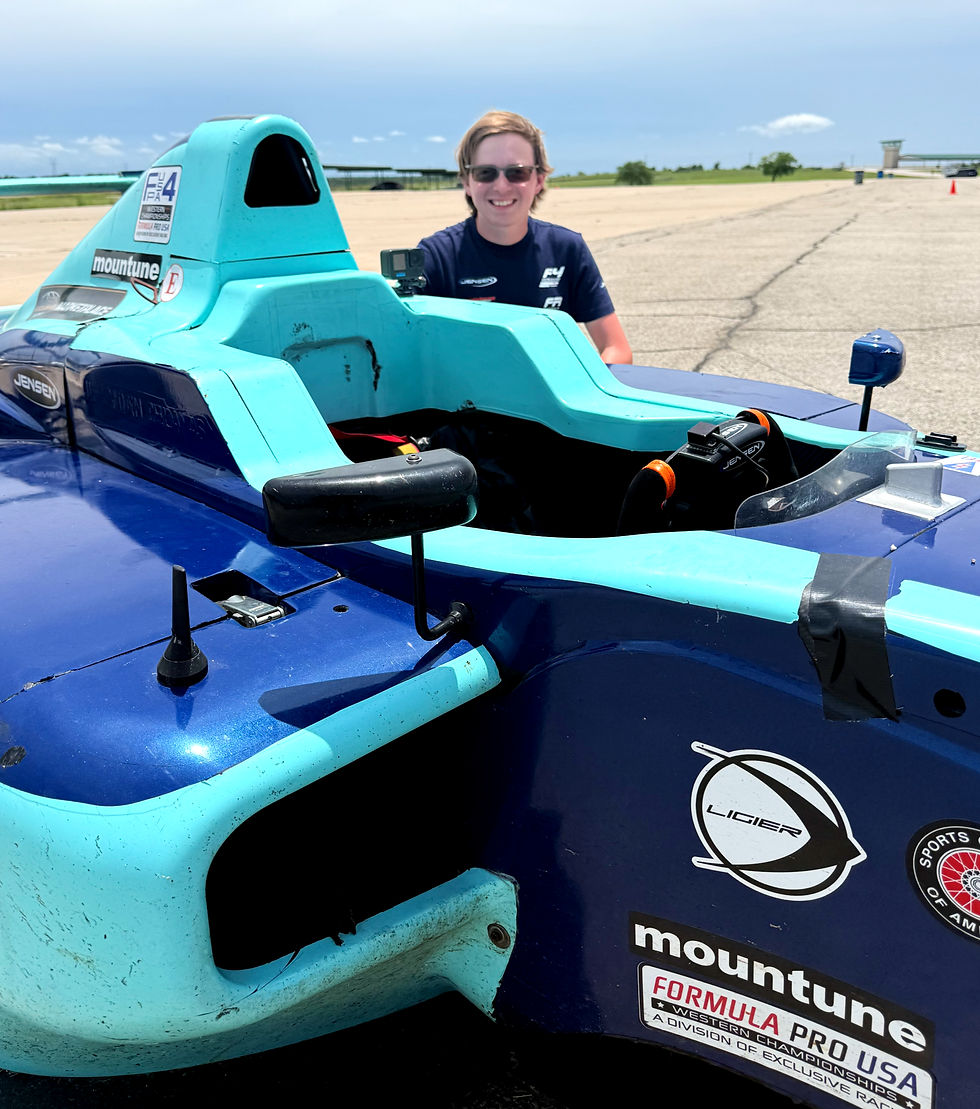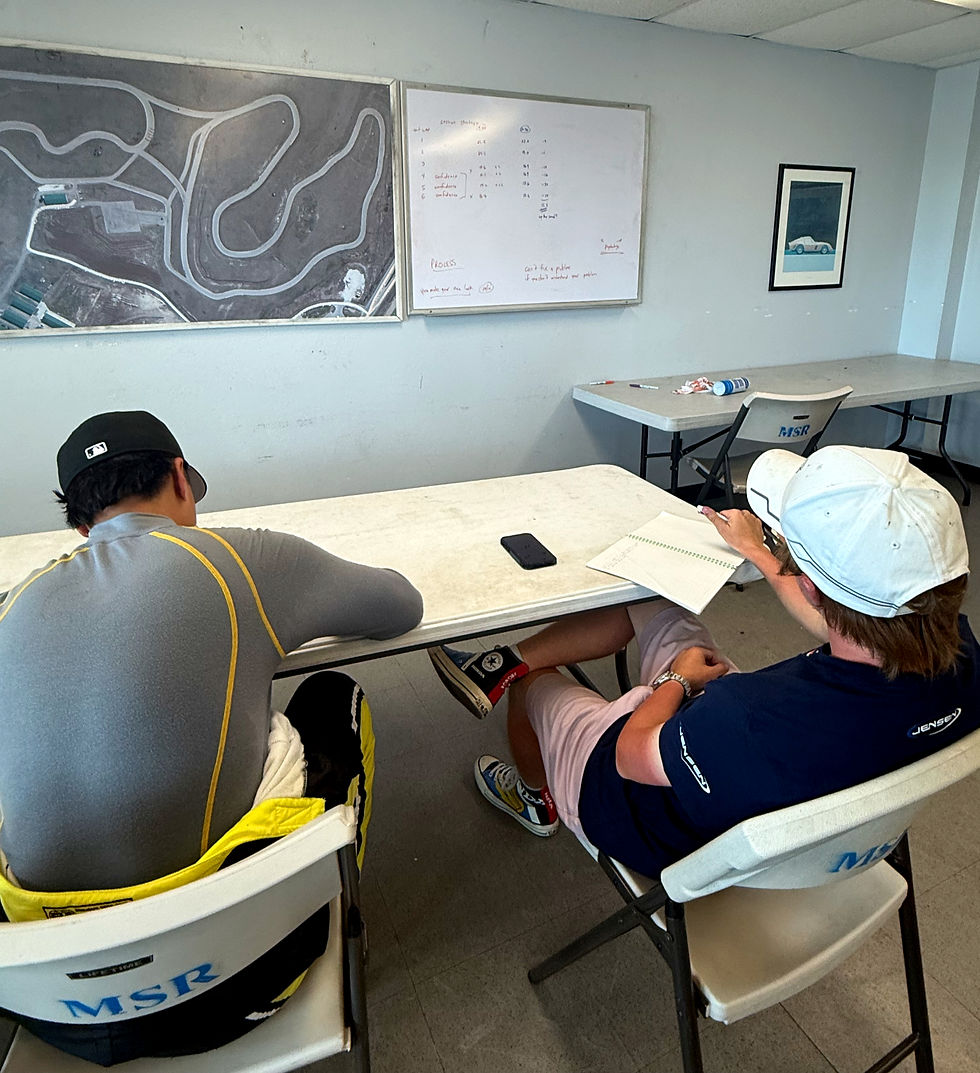University Engineering Internship Eli Cossel
- Eric Jensen

- Jul 20, 2025
- 4 min read
July 20, 2025

UNIVERSITY OF KENTUCKY AEROSPACE AND MECHANICAL ENGINEERING SENIOR SHARES HIS INTERNSHIP EXPERIENCE
Hello, my name is Eli Cossel. I am from Frankfort Kentucky, and I am a senior at the University of Kentucky. I am an aspiring motorsports engineer, hoping to work as an aerodynamicist in the professional car racing industry.
JENSEN F4 team owner Eric Jensen asked me to share in my internship experience in my words, more specifically from a four day test at the circuit located in Fort Worth Texas working with three young drivers including Robert Arana from San Antonio, John O'Donnell from Boston, and Jeremiah Thomas from Memphis.

As an intern with the JENSEN F4 team, I have learned the DAG role ( "Data Acquisition Guy" ) which involves downloading the computer data from the race cars after each sessions, and preparing the data to be reviewed with the drivers to show them where they can make improvements for the next on track sessions. Along with this, Eric Jensen instructed me and the young drivers in a variety of subjects like physics, engineering, and psychology in motorsports.
I learned very quickly that racing is just math and science! That may even be (subconsciously) the reason I got so invested in motorsport a couple years ago.
During the track days, Mr. Jensen spent significant amounts of time in the classroom between track sessions to teach the fundamentals of how to be a good racecar engineer and
driver. The knowledge he shared with me and many drivers has completely changed the way that I think about racing. There are many concepts that I learned that were contrary to common beliefs or knowledge, but Mr. Jensen’s way was mathematically and scientifically correct.
Most importantly, I saw the young drivers get faster with each bit of knowledge Mr. Jensen would teach us.

Out of the tasks I was instructed to do, one that I came to appreciate the most was to maintain a notebook. Mr. Jensen had me take notes on everything I was taught. This required me to think critically about the content and manner of what was being taught, and in the end, it helped me to more thoroughly understand the lessons.
Regarding the material that was covered during instruction, mostly I was briefed on the math and physics that build motorsports racing. I have mentioned this already in this article, but I want to really emphasize how much of a difference this knowledge made to me. During the test days when drivers were on and off track practicing, Mr. Jensen was able to connect ideas from physics and the build of the racecar to the events happening on track in an easy to understand way. Most of this instruction was in a class setting where he would work out the mathematics and draw diagrams to help correlate the information from concept to reality. This helped me establish and appreciate the ideas that go into the scientific process of understanding racing.
Aside from the academic side of my trip to Fort Worth, Texas, I was also taught the etiquette and discipline that goes into working on a racecar team. Mr. Jensen instilled values in me that all circulated around the concept of “Do your job.” To maximize workflow and minimize
misunderstandings, I was taught to approach the jobs given to me with a full focus and concise mindset.
If Mr. Jensen told me to do something, that took priority and was something I must fully focus on before moving on to other topics or tasks. The discipline I learned by working with Mr. Jensen helped me to optimize my time and soon enough, I was able to complete and be involved in much more of the racecar work by the end of the five-day testing period.
Specifical examples included hot and cold tire pressures, and fuel management. Mr. Jensen explained the importance of always understanding the weight of the race car, and how to calculate the required fuel for each track session to keep the race car near it's minimum weight limit in order to set fast lap times. Mr. Jensen also explained how the tire pressures impacted the race car's performance, and how the starting pressures would change throughout the day based upon significant changes in track temperature.

Something I had not thought about deeply before working with Mr. Jensen was the
psychology of racecar drivers and engineers. When working on track, I learned that your brain’s
responses to events and such matter just as much as the math and physics.
One of these concepts that I took note of the most was the fear that drivers may experience. I always thought that drivers would be able to execute their knowledge as long as they knew it, but something that holds them back is their brain’s fear mechanism. Once this was explained to me, it made perfect sense and seemed like a simple concept. There are many cognitive limitations that can arise subconsciously and cause the driver to react reflexively. Once I learned this concept, it was like a whole new door opened in my head and I had an epiphany moment.

I have absolutely loved my time working with this team so far. Eric Jensen is a wonderful guy; he has so much knowledge and expertise in motorsports. He has taught me math, physics, psychology, and discipline all in a single 5-day testing period. I greatly appreciate everything he has allowed me to participate in with the team, and I look forward to working with him and the many drivers he teaches.
To anyone that needs driver coaching or is in my position and interested in motorsport engineering, I promise you, working with this team is worth it and will take you far!
For more information about JENSEN race car engineering internships, and our Racing Camp programs, contact Eric Jensen via email at jensen@jensenga.com



Comments